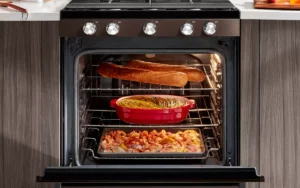Kitchen appliances are the backbone of a functional home, but like all things, they don’t last forever. While repairs can extend their lifespan, there comes a point when replacing them is the smarter choice. Upgrading not only improves efficiency but can also save you money in the long run. Here are five clear signs that it’s time to bid farewell to your aging kitchen appliances and embrace something new.
1. Frequent Repairs Are Adding Up
If you feel like your appliance repairman is on speed dial, it might be time for an upgrade.
- What to look for:
- Multiple service calls in a year for the same appliance.
- Replacement parts that are becoming harder to find (a sure sign of an outdated model).
- Repair costs that exceed 50% of the price of a new appliance.
- Why it matters: Frequent repairs can quickly add up, costing more than a brand-new appliance over time. Modern models are often more reliable, making them a better long-term investment.
- Pro Tip: If your appliance is older than its typical lifespan (see below), replacing it is often the more economical choice.
2. Your Energy Bills Are Rising
Old appliances are notorious for being energy hogs, which can spike your utility bills.
- What to look for:
- Appliances that have not earned an ENERGY STAR® rating or other efficiency certifications.
- A noticeable increase in electricity or water usage despite no change in habits.
- Loud noises or excessive heat when the appliance is running, signs that it’s working harder than it should.
- Why it matters: Newer appliances are designed to be more energy-efficient, reducing electricity and water usage significantly. Switching to an energy-efficient model can save you hundreds of dollars a year.
- Pro Tip: Check the yellow energy guide sticker on your current appliance to compare its efficiency to newer models.
3. It’s Past Its Prime
Every appliance has a typical lifespan, and once it’s past that point, its performance and efficiency decline.
- Average lifespans of major kitchen appliances:
- Refrigerator: 10-15 years.
- Dishwasher: 8-10 years.
- Microwave: 8-10 years.
- Oven/Range: 10-15 years (gas ranges may last longer).
- Garbage Disposal: 10 years.
- What to look for:
- Signs of wear and tear, like rust, cracked interiors, or broken seals.
- Performance issues, such as inconsistent cooking, uneven cooling, or poor water drainage.
- Why it matters: Old appliances are more prone to breakdowns, inefficiencies, and even safety hazards. Upgrading ensures you’re not caught off guard by sudden failures.
4. It’s No Longer Meeting Your Needs
Your lifestyle evolves, and your appliances should keep up.
- What to look for:
- A refrigerator that’s too small for your growing family or can’t accommodate modern features like large beverage containers.
- A dishwasher that requires constant handwashing because it doesn’t clean effectively.
- An oven with uneven heat, making baking or roasting more frustrating than fun.
- Why it matters: Modern appliances are packed with features that make life easier—like smart technology, faster cooking times, and larger capacities. If your appliances feel outdated or impractical, it’s time for an upgrade.
- Pro Tip: When shopping for replacements, prioritize appliances that suit your current lifestyle and kitchen habits.
5. Safety Concerns or Strange Behaviors
Old appliances can become safety hazards if they’re malfunctioning.
- What to look for:
- Sparks, smoke, or burning smells: These are immediate red flags that something is wrong.
- Overheating: If your appliance feels excessively hot to the touch, it may have wiring or motor issues.
- Leaks or water pooling: Especially with dishwashers or refrigerators, leaks can lead to water damage or mold growth.
- Loud or unusual noises: Grinding, buzzing, or clunking sounds often indicate internal damage.
- Why it matters: Safety always comes first. Continuing to use a malfunctioning appliance puts your home at risk of fires, electrical issues, or water damage.
Bonus: Other Clues It’s Time for an Upgrade
- It looks outdated: While not a performance issue, an appliance that doesn’t match your kitchen’s style can detract from its overall aesthetic.
- Limited features: If your appliance lacks conveniences like timers, energy-saving modes, or smart tech, a newer model can make life much easier.
- Warranty expiration: Once your warranty expires, repair costs can skyrocket, making replacement more appealing.
Final Thoughts: Upgrade for Efficiency and Peace of Mind
While replacing a major kitchen appliance can feel like a big expense, it’s often the smarter and safer choice when repairs, inefficiency, or safety concerns pile up. Upgraded appliances save money, improve your home’s energy efficiency, and give you access to modern features that simplify your daily life. By paying attention to these signs, you’ll know exactly when it’s time to make the switch—and enjoy a smoother, more stylish kitchen in the process.








